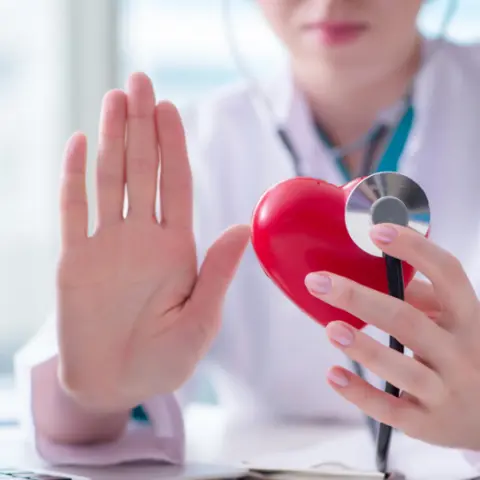MENOPAUSE AND HEART DISEASE
Why look into menopause and heart disease connection?
Menopause women have a very good and valid reason why - Cardiovascular diseases are the leading cause of death for older women in the United States, Canada and Australia.
Did I hear you say..."Finally, I am done with menopause! I can now enjoy life and live to the fullest!"
But… wait? I went to the doctor last week for a series of laboratory and the results are in but why is my bad cholesterol higher than my usual results on previous tests? What's going on? Is it true what they say menopause and heart disease happens to a lot women my age? Oh wait, I have to run real fast (with criss-crossed legs) toward the comfort room because I can no longer hold my pee! I need to pee right now!
Yeah, and oh not to mention the feeling of being irritable and I am more sensitive and emotional these past days and my mood seems to change real quick.
I guess I heard these stories among my friends and thought they were exaggerating! But oh my, they are all true! I must know.
You might think you can relate to the above-mentioned experience. You most likely know menopause and all its symptoms and complications. Now let us focus on one, topping the most notorious complication of menopause among women - (no, not about love but something related to the organ) heart disease.
Coronary heart disease is the leading cause of death for women aged 45-64 - The Australian Institute of Health and Welfare
But Why Menopause and Heart Disease?
Does menopause and heart disease goes hand in hand.
Prior to menopause, you have a very healthy amount of hormones in your body called estrogen and they are produced by your ovaries. The estrogen hormone is responsible for your blood vessels to loosen up and balances your cholesterol levels - both good and bad. However, life after menopause usually at age 55 or higher means lower levels of estrogen.
Given the change, this will impose striking increase of heart disease risks to your health. Your blood vessels will start to accumulate fats and cholesterol resulting to higher pressure up to the heart then probably resulting to heart attack or other heart disease. This is also true when bad cholesterol is accumulated in the blood vessels going to the brain, it will probably result to stroke (1).
I've been to my GP just a few weeks ago for blood test results of my annual check up.
She greet me with a big smile as soon as entered the room, saying "I'm so happy with your test results. Whatever you're doing, keep doing it!" as I was about to sit on the chair.
Our health is in our hands. Taking charge of my health and being proactive about it is paying off.
I was 53...
Menopause and Heart Disease
- 5 Tips to Reduce the Risks (2)
1. You have to exercise regularly
You have to constantly stretch or exercise those muscles to make it more healthy and strong. Since estrogen level is too low, you have to help your body through exercises of about 150 minutes per week at best (Yeah, we know it is tough to dress up and wake up early in the morning to do jogging or brisk walking but it will go a long way for the heart disease to go away).
Exercising helps improve blood circulation in the body and reduces cholesterol levels as well as high blood pressure and weight.
It is also a good way to relieve yourself of life’s daily stresses (I mean, who doesn’t want that anyway?!), thus reducing the risk of developing a heart disease or other complications of menopause.


2. You should eat wholesome and nutritious food
Eating well to avoid heart disease includes fruits, vegetables, whole grains and other foods which are high in fiber and rich in proteins and yet low in saturated fat and trans fat.
Eat plenty of vegetable, fruits and whole grains... in that order.
You should also eat other foods which are high in fiber and rich in proteins and yet low in saturated fat and trans fat.

3. Stop smoking
Smoking increases the risk of having a heart disease by twice as much compared to non-smokers.
Smoking increases the risk of having a heart disease by twice as much compared to non-smokers.
Smoking increases the risk of having a heat disease by twice as much compared to non-smokers.

4. Maintain your ideal body weight
Find your ideal body weight and maintain it.
"Research has shown that being overweight contributes to the onset of heart disease."(3)
The heart works harder depending on your weight, the heavier you are, the harder your heart has to work.

5. Sleep well
Make sure to have enough and quality sleep and rest. A lot of people think that sleep a luxury.
Needless to say, sleep is a very important part of keeping yourself well.
It can be easier said than done. Find ways so you can have enough and quality sleep like drinking caffeine free drink like Sleep Well or Magnesium supplement an hour before going to bed.
“The American Heart Association (AHA) note that, while a decline in estrogen due to menopause may increase the risk of cardiovascular disease, taking hormone therapy will not reduce this risk.”, says Medical News Today. (3)
On the other hand, there is an alternative option of using healthy and non-toxic products such as herbs to alleviate the symptoms of menopause as well as natural, organic, and vegan skin care for a healthy skin regimen without compromising your own health.
Thus, with these options available, it is still best and important to discuss the strategy, benefits and risks of any treatment or option you are considering with your health-care provider or attending physician before actually availing them.
All in all, menopause and heart disease doesn't need to go hand in hand.
Taking care of your body as you enter the menopausal stages from transition to postmenopausal up to proper handling of the risks of heart diseases and other complications of menopause will really go a long way to prepare you for the drastic changes which your body will undergo.
This will have great benefits mentally, physically, emotionally and other aspects of life. And all of us will only want what is the best in there for us.
REFERENCES
(1) https://www.womenshealth.gov/menopause/menopause-and-your-health
(2) https://www.webmd.com/menopause/guide/menopause-heart-disease#1
(3) https://www.medicalnewstoday.com/articles/155651.php
Taking care of your body as you enter
the menopausal stages from transition to postmenopausal up to proper handling
of the risks of heart diseases
and other complications of menopause
will really go a long way to prepare you for the drastic changes which your body will undergo.
RELATED POSTS

MENOPAUSE AND HEART DISEASE
Cardiovascular diseases are the leading cause of death for older women in the United States, Canada and Australia.

DEPRESSION IN MENOPAUSE
Depression in Menopause is more common than you may think.

MENOPAUSE AND INSOMIA
This is a more common complaint in women than in men and is detrimental to your health.

MENOPAUSE & HYPERTENSION
The onset of hypertension during menopause can cause additional concerns to women's health.

MENOPAUSE & WEIGHT GAIN
Weight gain can rob you of expanded activities you can do before and foods you want to eat - yes, because you...

MENOPAUSE & HOT FLASHES
One of the most common complications of menopause is probably the hot flashes and the one that can last for a long time...
EXPLORE

STAGES OF MENOPAUSE
The clues and symptoms are the result of unbalanced and changing hormone levels of oestrogen in your body.

COMPLICATIONS
Complications of menopause - the risks women face for certain health problems; heart disease, depression, weight gain, insomnia, hypertension, osteoporosis

MENOQUOTES
There are 3 billion women who, sooner or later will experience Menopause but many still find it uncomfortable to talk about… it’s about time we change this.